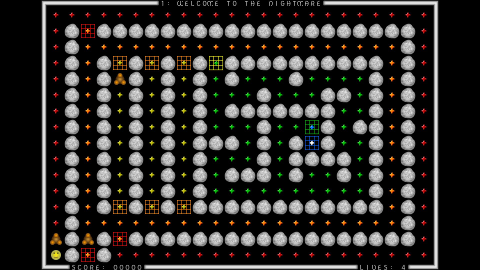Back in the mists of time, the first game released by Soft Rock Software was Escape from Exeria, a game in which the player navigates mazes to collect things while avoiding the bad guys – but unlike the most famous example of its kind, with an added puzzle element. Updated and re-released in the mid-1990s, the company has taken another look at it recently and given it a new lease of life.
A new version of the game is now available from for a mere £5.00 featuring higher resolution graphics, twice as many levels to complete, and a new twist to the gameplay.
The game’s plot is that you were sent to the prison mines of Exeria for a terrible crime against fashion, and you are trying to escape. Each individual mine has twists and turns that you must navigate in order escape to the next, but not all passages can be accessed – they’re blocked off by cages, and to open these you must first collect all the stars of the same colour. With that done, the cage opens and you gain access to the next section, and so on.

Beware, though. At first, the guards take a very simple approach to searching for the escaped prisoner – that’s you, by the way – they just patrol the maze in a predictable manner, so they are easy to avoid. However, at a certain point in each level they get nastier, and instead of just patrolling, they start tracking you. And from level 41 on, that simple approach to seeking you out changes as well, making the game much harder from that point on.
As well as forty new mazes, doubling up from the original forty, and a new challenge from the guards, the game also now features a difficulty level setting that makes it easier to play – well, very marginally, anyway – and brand new sound effects to go with the updated, higher resolution graphics. And, two and a half decades on, a bug present in the mid-1990s version has finally been fixed!
The new version of Escape from Exeria is priced at £5.00 and is available to buy from !Store. It runs at a resolution of 1920×1080 pixels in sixteen million colours, and is therefore only usable on computers capable of that – but that includes all recent hardware platforms (Raspberry Pi, ARMX6, Titanium, etc), as well as emulated systems such as VirtualRiscPC and RPCEmu.

